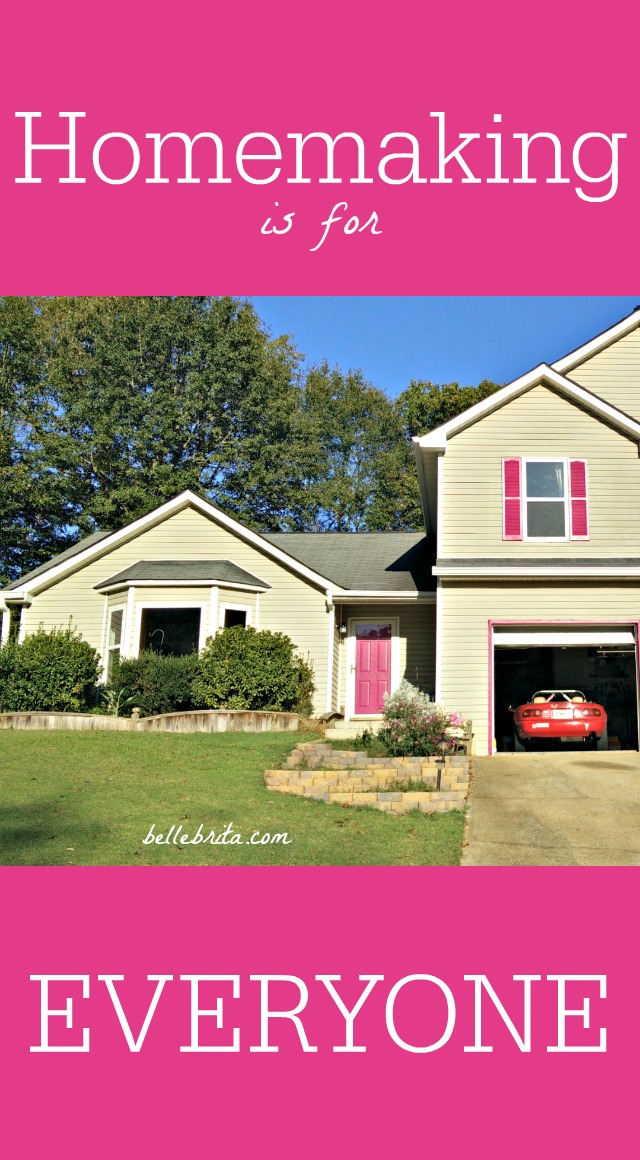When you think of a homemaker, who comes to mind?
June Cleaver, in an apron and pearls…
The Duggar women…
Your own mother or grandmother…
When I think of a homemaker, I think of myself, but I also think of my husband.
I think of my mom, who stayed home with my brothers and me until I was a young teenager… But I also think of my dad.
Related: 13 Lessons My Mother Taught Me about Womanhood
At its core, homemaking is just keeping your own living space comfortable. What that looks like will differ greatly from person to person and family to family.
Who is a homemaker?
If you live in your own space, you can be a homemaker.
Before Dan and I got married, I lived in a one-bedroom efficiency apartment. It was small, but it was all my own.
For 10 months out of the 15 months I lived in that apartment, I worked 2 jobs.
But I was still a homemaker.
I decorated my apartment primarily with art and posters I’d purchased in college. I kept my apartment reasonably clean, even if my bedroom wasn’t always tidy. My apartment didn’t have a dishwasher, so I washed everything by hand, and I never let my dirty dishes pile up too much.
You don’t have to be a stay-at-home-parent or a housespouse to be a homemaker. If you have some space of your own, whether that’s just a bedroom in your parents’ house, or a three-bedroom house you share with your spouse, then you can be a homemaker.

What is homemaking?
According to Google, homemaking is:
the creation and management of a home, especially as a pleasant place in which to live
The following activities can all be included as part of homemaking, but you don’t have to do them all yourself to be a homemaker.
- meal-planning
- buying groceries
- cooking
- cleaning
- doing laundry
- doing dishes
- paying bills
- decorating
- doing home repairs/maintenance
- gardening
- doing yard work
- raising children
- homeschooling
I’m sure there are other tasks I’m not considering, but these are all aspects of homemaking.
You could also just call this “adulting.”
While some of these tasks are situational, others are true for most people.
Bills need to be paid on time if at all possible.
If you’re not taking care of children or doing messy work, then you should probably wear clean clothes.
It’s okay to be messy or to stretch the definition of clean, but overall, living in a reasonably clean environment is good for your health.
Learning the basics of homemaking should be a key component of adulthood. Unfortunately, for some unknown reason *coughsexismcoughthepatriarchycoughthedevaluationofwomenslaborcough* not all adults know even basic homemaking skills.
Homemaking as invisible labor
Much of homemaking is invisible labor. Small tasks done on a daily basis that easily go unnoticed. Tasks that are necessary, expected, and often thankless.
When people visit my home, I can point to the furniture Dan built or the pink door he painted. I praise my husband for all the things he’s done around the house.
Dan’s share of our homemaking is largely projects around the house and the yard. His homemaking contributions are big and showy.
But when Dan gives a tour of the house, he doesn’t point out the kitchen sink that I keep clean and clear of dishes on a daily basis. He doesn’t brag about the low volume of dirty laundry in our hampers because I consistently do all the laundry.
My share of our homemaking is primarily daily, weekly, and monthly tasks that have to be done over and over and over again. Even though these tasks are consistent and necessary, no one will notice my contributions to our household unless I just don’t do them for a week.
All of homemaking is valuable, both the showy projects and the invisible labor.
We need to treat all of homemaking as valuable, even though it’s unpaid labor. Even though much of it is invisible labor.
Learning homemaking
Homemaking isn’t easy.
And contrary to common belief, cleaning and cooking and running a household don’t come “naturally” to women.
Nah, I learned that shit through freaking YEARS of practice. I wasn’t born knowing how to do laundry or how to throw together a meal based on random available ingredients.
Those are skills I learned, starting when I was just a kid, when my parents assigned chores to my twin brother and me.
But even if you didn’t practice homemaking in childhood, you can still learn homemaking today.
YouTube has tons of resources. Check out this playlist on cooking basics!
I also found a YouTube channel all about cleaning.
How do you practice homemaking? What are your best tips for creating a home you love? Share your thoughts in the comments!

